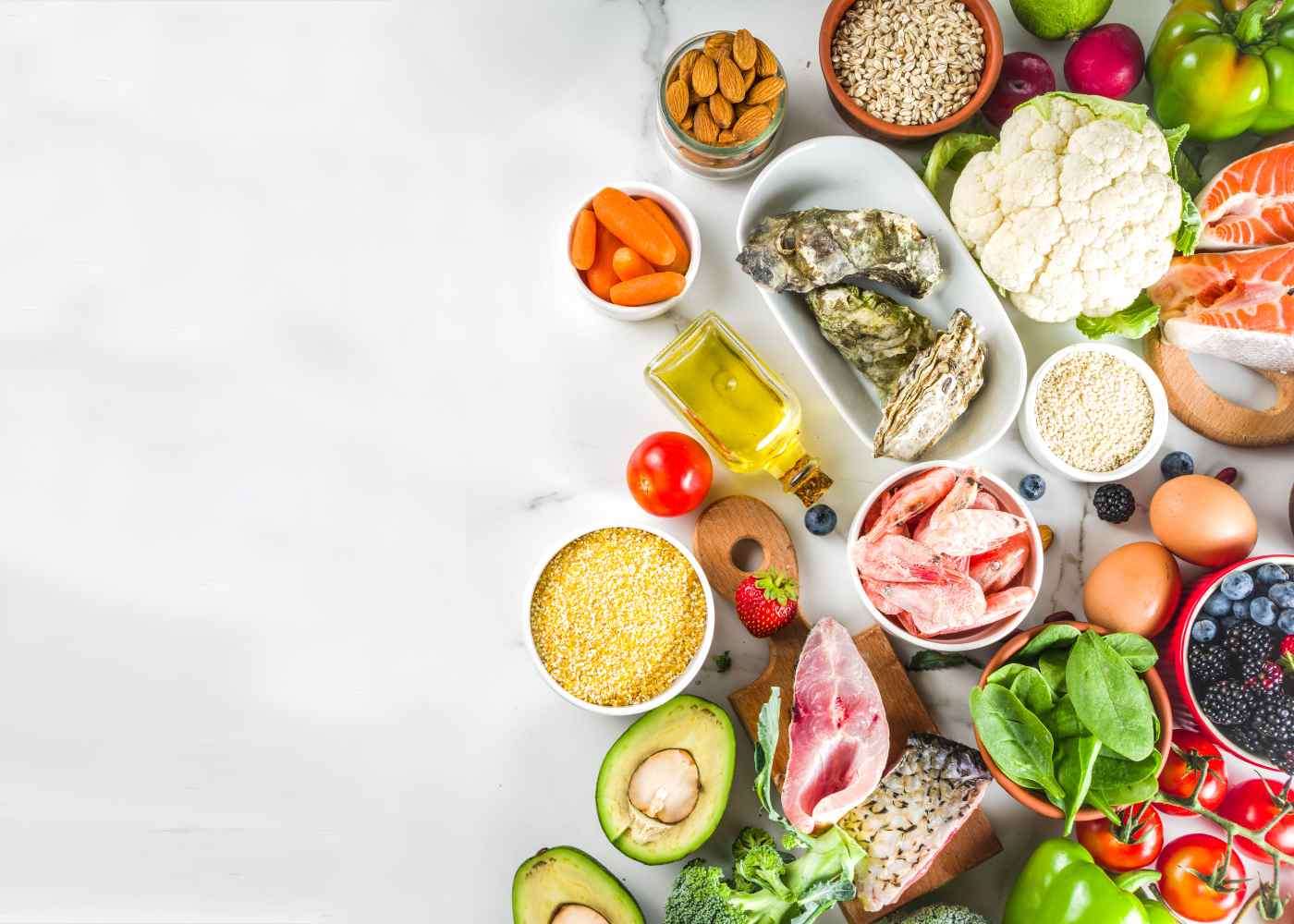Welcome to our comprehensive muscle gain meal plan for Dubai fitness enthusiasts! If you're looking to build muscle and achieve your fitness goals, then you're in the right place, a good muscle gain meal plan should provide enough calories, protein, carbs, and healthy fats to fuel your workouts and recovery. In this blog post, we will provide you with all the information you need to fuel your body for muscle gains and design a meal plan that will support your journey to a stronger, fitter physique. So let's get started!

Fueling Your Body for Muscle Gains
When it comes to achieving muscle gains, one of the most important
factors is fueling your body with the right nutrition. Consuming a balanced
diet is key to providing your muscles with the necessary nutrients to grow and
recover.
To ensure you're consuming enough calories for muscle
growth, it's important to calculate your daily calorie needs. This can be done
by determining your basal metabolic rate (BMR) and then adding calories based
on your activity level and goals.
Remember, it's not just about calories but also the quality
of the food you consume. Focus on incorporating nutrient-dense foods that
provide a good balance of proteins, carbohydrates, and healthy fats.
By following a comprehensive meal plan, you'll be able to provide your body with the right fuel it needs to support your muscle gains and reach your fitness goals.

Understanding Nutrient Timing
Nutrient timing plays a crucial role in muscle development. When you consume nutrients at specific times, you can maximize your muscle gains and optimize your overall performance. Here are some key points to understand about nutrient timing:
Why Nutrient Timing is Important for Muscle Development
The timing of nutrient consumption is important because it affects muscle protein synthesis, glycogen replenishment, and overall recovery. By strategically timing your meals, you can enhance muscle growth and repair.
How to Properly Time Your Meals for Optimal Muscle Gains
To properly time your meals for muscle gains, consider the
following:
1. Pre-Workout Nutrition: Consuming a balanced meal or snack
rich in carbohydrates and protein before your workout can provide energy and
amino acids for your muscles.
2. Post-Workout Nutrition: It is crucial to consume protein and
carbohydrates within a specific time frame after your workout to maximize
muscle recovery and growth.
3. Intra-Workout Nutrition: Some individuals may benefit from
consuming a combination of carbohydrates and protein during their workout to
maintain endurance and prevent muscle breakdown.
4. Before Bed Nutrition: Eating a slow-digesting protein source
before bed can provide a sustained release of amino acids during the night,
promoting muscle synthesis.
By properly timing your nutrient intake, you can optimize your body's ability to build and repair muscle tissue, leading to greater gains in strength and size.

Designing Your Meal Plan
To ensure optimal muscle growth, it is important to have a well-designed meal plan that provides your body with the right nutrients at the right times. Here are some steps to help you create a muscle-gain meal plan:
1. Calculate your calorie needs:
Before you start planning your meals, it is essential to determine your daily calorie needs for muscle growth. Use an online calculator or consult a nutritionist to get an estimate of your total daily energy expenditure (TDEE).
2. Set your protein intake:
Protein is a crucial nutrient for muscle building. Aim to consume around 1.2-1.5 grams of protein per pound of body weight. Distribute your protein intake evenly throughout the day to maximize muscle protein synthesis.
3. Include complex carbohydrates:
Carbohydrates provide the energy necessary for intense workouts and muscle recovery. Opt for complex carbohydrates like whole grains, fruits, and vegetables. Aim to consume around 2-3 grams of carbohydrates per pound of body weight.
4. Choose healthy fats:
Fats are important for hormone production and overall health. Include sources of healthy fats such as avocados, nuts, and olive oil in your meals. Aim to consume around 0.3-0.5 grams of fat per pound of body weight.
5. Plan your meals:
Divide your daily calorie and macronutrient goals into several meals throughout the day. Aim for 4-6 meals depending on your preference and schedule. Make sure each meal includes a good source of protein, carbohydrates, and fats.
6. Meal prepping:
To stay consistent with your muscle gain meal plan, consider
meal prepping. This involves preparing your meals in advance for the week.
Cooking and portioning your meals ahead of time can help you stay on track and
avoid unhealthy food choices.
Remember, everyone's nutritional needs may vary, so it is important to listen to your body and make adjustments as needed. Consistency and adherence to your meal plan will be key in achieving your muscle gain goals.

Optimal Protein Sources for Muscle Growth
When it comes to building muscle, protein is the most
important nutrient you need to focus on. It provides the building blocks needed
to repair and grow your muscles. Here are some of the best protein sources for
muscle building:
- Lean meats such as chicken breast, turkey, and lean beef
- Seafood like salmon, tuna, and shrimp
- Eggs and egg whites
- Low-fat dairy products such as Greek yoghurt, cottage cheese,
and milk
- Plant-based proteins like tofu, tempeh, and edamame
- Nuts and seeds, including almonds, peanuts, chia seeds, and
hemp seeds
- Legumes and beans such as chickpeas, lentils, and black
beans
To ensure that you're getting enough protein throughout the day, try to incorporate it into every meal. For example, you could have grilled chicken breast with quinoa and vegetables for lunch, a Greek yoghurt smoothie with berries and spinach for a snack, and grilled salmon with brown rice and asparagus for dinner.

Incorporating Healthy Carbohydrates into Your Diet
Carbohydrates play a vital role in muscle gain as they
provide the necessary energy for intense workouts and help in replenishing
glycogen stores. It is important to choose the right kinds of carbohydrates to
support your muscle-building goals.
Examples of Healthy Carbohydrate Sources:
- Whole grains such as brown rice, quinoa, and whole wheat
bread
- Legumes like lentils, chickpeas, and black beans
- Fruits and vegetables such as sweet potatoes, bananas, and
leafy greens
- Oats and oatmeal
- Dairy products like yoghurt and milk
When incorporating carbohydrates into your diet, aim for
complex carbs that provide a steady release of energy, rather than simple
sugars that cause quick spikes in blood sugar levels. This will ensure
sustained energy levels throughout your workouts and promote muscle growth.
Be mindful of portion sizes and try to include a source of carbohydrates
with each meal. This could mean having a serving of whole grains, legumes, or
fruits and vegetables alongside your protein source.
Remember to prioritize nutrient-dense quality carbohydrates and provide additional vitamins, minerals, and fiber necessary for overall health and muscle development.

Choosing the Right Fats for Muscle Building
When it comes to muscle building, not all fats are created equal. While some fats can be detrimental to your progress, others can support muscle growth. It's important to choose healthy fats that provide the necessary nutrients for your body to function optimally. Here are different types of fats and their effects on muscle development:
1. Monounsaturated Fats
Monounsaturated fats are known to promote muscle growth. They can help reduce muscle inflammation and enhance insulin sensitivity, which is crucial for muscle building. Good sources of monounsaturated fats include avocados, almonds, pecans, and olive oil.
2. Polyunsaturated Fats
Polyunsaturated fats are a great source of omega-3 and omega-6 fatty acids, which have anti-inflammatory properties. These fats play a vital role in muscle repair and growth. Fish, such as salmon and mackerel, along with flaxseeds and chia seeds, are excellent sources of polyunsaturated fats.
3. Saturated Fats
Saturated fats have been given a bad reputation, but they are essential for hormone production and muscle growth. However, it's important to consume saturated fats in moderation. Good sources of saturated fats include grass-fed beef, coconut oil, and full-fat dairy products.
4. Trans Fats
Trans fats should be avoided as much as possible, as they
have been linked to various health issues. These fats are often found in
processed and fried foods. Limit your intake of trans fats to support your
muscle-building goals.
To include healthy fats in your diet for muscle building, incorporate foods rich in monounsaturated and polyunsaturated fats. Be mindful of your saturated fat intake and avoid trans fats altogether. Remember, a balanced diet with the right fats plays a crucial role in optimizing muscle growth and overall health.

The Importance of Micronutrients
Micronutrients play a crucial role in muscle development and
overall health. While macronutrients like protein, carbohydrates, and fats are
often the focus when it comes to muscle gain, micronutrients are equally
important.
Micronutrients are essential vitamins and minerals that our body needs in small quantities to function properly. They act as catalysts for various processes in the body, including muscle repair and growth. Without an adequate intake of micronutrients, your muscle-building efforts may be hindered.
Key Micronutrients for Muscle Gain and Their Food Sources
Here are some key micronutrients that are important for
muscle growth and the food sources where you can find them:
1. Vitamin D: This vitamin helps with muscle function and
strength. Good sources include fatty fish, fortified dairy products, and
sunlight.
2. Vitamin C: Vitamin C plays a role in collagen synthesis
and helps with muscle recovery. Citrus fruits, berries, and vegetables like
bell peppers are rich sources.
3. Magnesium: Important for muscle contraction and protein
synthesis. Pumpkin seeds, almonds, and spinach are excellent sources of
magnesium.
4. Zinc: Zinc helps with protein synthesis and immune
function. You can find it in foods like oysters, beef, and legumes.
5. Iron: Iron is essential for oxygen transport to muscles.
Red meat, spinach, and lentils are great sources.
6. Calcium: Calcium is necessary for muscle contraction.
Good sources include dairy products, leafy greens, and fortified plant-based
milk alternatives.
Remember, it's important to consume a well-rounded diet that includes a variety of fruits, vegetables, whole grains, and lean protein sources to ensure you're getting an adequate amount of micronutrients for muscle growth.

Hydration and Muscle Development
Proper hydration is crucial for muscle building and overall
athletic performance. When you exercise, your body loses water through sweat,
and it's essential to replenish those fluids to maintain optimal muscle
function.
Here are some tips to stay hydrated during your workouts:
1. Drink plenty of water throughout the day: Aim for at least 8
glasses of water every day, and increase your intake if you engage in intense
workouts.
2. Hydrate before, during, and after exercise: Drink water
before your workout to ensure you start in a hydrated state. During your
workout, sip on water at regular intervals. After your workout, remember to
rehydrate to replenish lost fluids.
3. Consider electrolyte drinks: If you engage in prolonged or
intense exercise sessions, electrolyte drinks can help replenish both water and
essential electrolytes lost through sweat.
Hydration not only aids in muscle function but also contributes to overall energy levels and mental focus during workouts. Make it a priority to stay adequately hydrated to optimize muscle development and performance.

Supplements to Enhance Muscle Growth
While a well-balanced diet is key for muscle gain, supplements can also provide an extra boost to your progress. Here are some supplements that can aid in muscle growth:
1. Whey Protein
Whey protein is a popular supplement among fitness enthusiasts as it is a high-quality source of protein. Consuming whey protein after workouts can help promote muscle repair and growth.
2. Creatine
Creatine is a natural compound found in the body that helps produce energy for muscle contractions. Taking creatine supplements can increase muscle strength and power, leading to enhanced muscle growth.
3. Branched-Chain Amino Acids (BCAAs)
BCAAs, including leucine, isoleucine, and valine, are essential amino acids that the body cannot produce. They play a crucial role in muscle protein synthesis, which is the process of building new muscle tissue. Including BCAA supplements in your diet can support muscle gain.
4. Beta-Alanine
Beta-alanine is an amino acid that helps increase carnosine levels in muscles. Carnosine acts as a buffer against lactic acid buildup, delaying fatigue during intense workouts. Taking beta-alanine supplements can improve performance and contribute to muscle growth.
5. Fish Oil
Fish oil is rich in omega-3 fatty acids, which have
anti-inflammatory properties. Omega-3s can help reduce exercise-induced muscle
damage and support muscle recovery. Adding fish oil supplements to your diet
can enhance muscle growth and aid in overall recovery.
Remember, supplements should be used as a complement to a well-rounded diet and training program. Always consult with a healthcare professional or nutritionist before adding any supplements to your routine to ensure they are suitable for you and your specific goals.

Conclusion
In conclusion, having a comprehensive muscle-gain meal plan
is essential for Dubai fitness enthusiasts who are looking to build their
muscles. By fueling your body with a balanced diet and calculating your daily
calorie needs, you can set yourself up for success in achieving your muscle
growth goals.
Furthermore, understanding the importance of nutrient timing
and properly timing your meals can maximize your muscle gains. By designing a
meal plan and incorporating optimal protein sources into every meal, you can
ensure that your body is getting the nutrients it needs to build and repair
muscle.
Additionally, carbohydrates play a crucial role in muscle
gain. By incorporating healthy carbohydrate sources into your diet, you can
provide your body with the energy it needs to support your workouts and rebuild
muscle tissue.
Choosing the right fats and including healthy fats in your
diet is also important for muscle building. Different types of fats have
varying effects on muscle growth, so it's essential to choose the right fats
that support your goals.
Don't forget about the importance of micronutrients. Key
micronutrients such as vitamins and minerals play a vital role in muscle
development. By consuming foods rich in these micronutrients, you can ensure
that your body has everything it needs for optimal muscle growth.
Hydration is another critical factor in muscle development.
Staying hydrated during workouts is essential for performance and recovery.
Remember to drink enough water throughout the day to support your
muscle-building efforts.
Lastly, while supplements can aid in muscle growth, they
should be used strategically and in conjunction with a well-rounded diet.
Consult with a health professional to determine which supplements may be
beneficial for your muscle gain journey.
With a comprehensive muscle gain meal plan, proper nutrient
timing, and a focus on hydration, Dubai fitness enthusiasts can optimize their
muscle growth and achieve their fitness goals.


